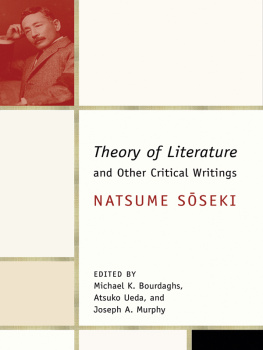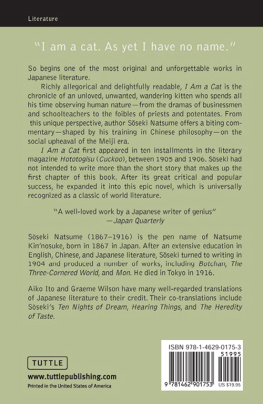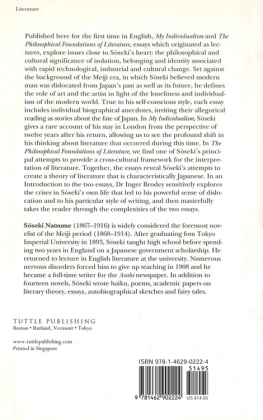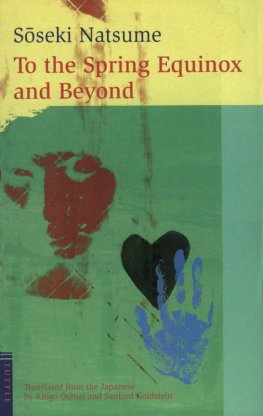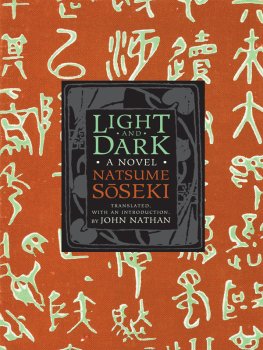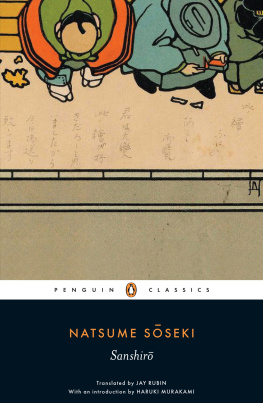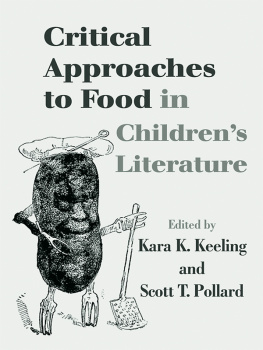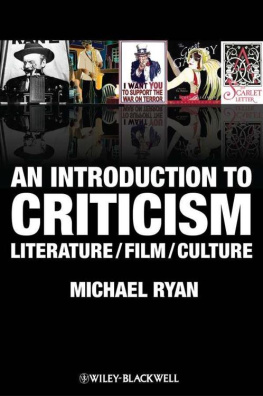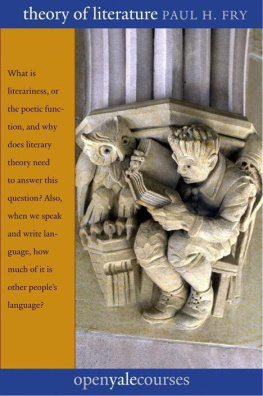THEORY OF LITERATURE AND OTHER CRITICAL WRITINGS
WEATHERHEAD BOOKS ON ASIA
WEATHERHEAD EAST ASIAN INSTITUTE, COLUMBIA UNIVERSITY
WEATHERHEAD BOOKS ON ASIA
WEATHERHEAD EAST ASIAN INSTITUTE, COLUMBIA UNIVERSITY
LITERATURE
David Der-wei Wang, Editor
Ye Zhaoyan, Nanjing1937: A Love Story, translated by Michael Berry (2003)
Oda Makato, The Breaking Jewel, translated by Donald Keene (2003)
Han Shaogong, A Dictionary of Maqiao, translated by Julia Lovell (2003)
Takahashi Takako, Lonely Woman, translated by Maryellen Toman Mori (2004)
Chen Ran, A Private Life, translated by John Howard-Gibbon (2004)
Eileen Chang, Written on Watter, translated by Andrew F. Jones (2004)
Writing Women in Modern China: The Revolutionary Years, 19361976, edited by Amy D. Dooling (2005)
Han Bangqing, The Sing-song Girls of Shanghai, first translated by Eileen Chang, revised and edited by Eva Hung (2005)
Loud Sparrows: Contemporary Chinese Short-Shorts, translated and edited by Aili Mu, Julie Chiu, Howard Goldblatt (2006)
Hiratsuka Raich, In the Beginning, Woman Was the Sun, translated by Teruko Craig (2006)
Zhu Wen, I Love Dollars and Other Stories of China, translated by Julia Lovell (2007)
Kim Sowol, Azaleas: A Book of Poems, translated by David McCann (2007)
Wang Anyi, The Song of Everlasting Sorrow: A Novel of Shanghai, translated by Michael Berry (2008)
Choe Yun, There a Petal Silently Falls: Three Stories by Choe Yun, translated by Bruce and Ju-Chan Fulton (2008)
Inoue Yasushi, The Blue Wolf: A Novel of the Life of Chinggis Khan, translated by Joshua A. Fogel (2009)
HISTORY SOCIETY, AND CULTURE
Carol Gluck, Editor
Takeuchi Yoshimi, What Is Modernity? Writings of Takeuchi Yoshimi, edited and translated, with an introduction, by Richard F. Calichman (2005)
Contemporary Japanese Thought, edited and translated by Richard F. Calichman, (2005)
Overcoming Modernity, edited and translated by Richard F. Calichman (2008)
Theory of Literature and Other Critical Writings
NATSUME SSEKI
EDITED BY
Michael K. Bourdaghs, Atsuko Ueda, and Joseph A. Murphy
COLUMBIA UNIVERSITY PRESS
NEW YORK
This publication has been supported by the Richard W. Weatherhead Publication Fund of the Weatherhead East Asian Institute, Columbia University.
Columbia University Press wishes to express its appreciation for assistance given by the Pushkin Fund toward the cost of publishing this book.
COLUMBIA UNIVERSITY PRESS
PUBLISHERS SINCE 1893
NEW YORK CHICHESTER, WEST SUSSEX
cup.columbia.edu
Copyright 2009 Columbia University Press
Paperback edition, 2010
All rights reserved
E-ISBN 978-0-231-51831-4
Library of Congress Cataloging-in-Publication Data Natsume, Soseki, 18671916.
Theory of literature and other critical writings/Natsume Soseki ; edited by Michael K. Bourdaghs, Atsuko Ueda, and Joseph A. Murphy.
p. cm. (Weatherhead books on Asia)
Includes bibliographical references and index.
ISBN 978-0-231-14656-2(cloth : alk. paper) ISBN 978-0-231-14657-9 (pbk . : alk. paper) ISBN 978-0-231-51831-4 (electronic)
1. Literature. I. Bourdaghs, Michael K. II. Ueda, Atsuko. III. Murphy, Joseph A. (Joseph Anthony), 1961 IV. Title. V. Series.
PN45.N356 2009
A Columbia University Press E-book.
CUP would be pleased to hear about your reading experience with this e-book at .
References to Internet Web sites (URLs) were accurate at the time of writing. Neither the author nor Columbia University Press is responsible for URLs that may have expired or changed since the manuscript was prepared.
To Brett de Bary
from her students, direct and indirect
Many scholars contributed to the effort that led to this volume. The editors would like to thank Rachael Hutchinson, Jay Rubin, and Keith Vincent for contributing translations to this project. We would also like to thank Ayako Kano and Thomas LaMarre for their generous help in untangling many of the intellectual and linguistic puzzles that we encountered in Ssekis theories. Suggestions from two anonymous readers helped make this a better book. We wish to express our gratitude to Jennifer Crewe and her colleagues at Columbia University Press for their patience and support. Jay Rubins translation of My Individualism is reprinted here by kind permission of Monumenta Nipponica, the Pacific Basin Institute at Pomona College, and the translator.
This book is the end product of a series of workshops and conferences organized by the editors over the course of several years. We would like to express our gratitude to all who participated in those events, in particular: Mark Anderson, Anna-Marie Farrier, Norman Holland, Iida Yko, Karatani Kjin, Komori Yichi, Tom Looser, Masumitsu Keiko, Richard Okada, Dan ONeill, Vincent Pecora, Atsuko Sakaki, Ann Sherif, and, finally, Brett de Bary, to whom we dedicate this volume.
Michael K. Bourdaghs, Joseph A. Murphy, and Atsuko Ueda
Natsume Sseki
For university students majoring in literature today, one of the first lessons in literary theory involves studying the history of shifting definitions of the term literature and its counterparts in other languages. We are often under the impression that this questioning is a recent development, that only sophisticated postmoderns would consider suspect a term that previous generations no doubt considered natural and universal.
In fact, probing the instabilities that haunt the category of literature is not a new activity. The eponymous hero of Natsume Ssekis 1908 novel Sanshir, a student newly arrived in metropolitan Tokyo from rural Kyushu, attends his first day of classes at Tokyo Imperial University. His second class of the day is a lecture course on literary theory (bungakuron).
The professor entered the classroom and paused to look at the blackboard, where someone had written Geschehen and Nachbild. Hm, German, he said and, laughing, proceeded to rub them out with great vigor. This destroyed for Sanshir some of the respect with which he had until then regarded the German language. The professor went on to list twenty definitions of literature that had been formulated by men of letters down through the ages. These, too, Sanshir recorded carefully in his notebook.
As he grows savvier, Sanshir will also lose his respectful habit of taking careful notes and even of attending class. He learns from classmates that lectures today are not up to the standards of earlier professors, such as Lafcadio Hearn. In turn, Sanshir becomes embroiled in university politics, including a campaign by students to replace foreign professors of literature with native Japanese scholars.
Readers of the novel familiar with the authors personal history (as most readers during its initial serialization in the

